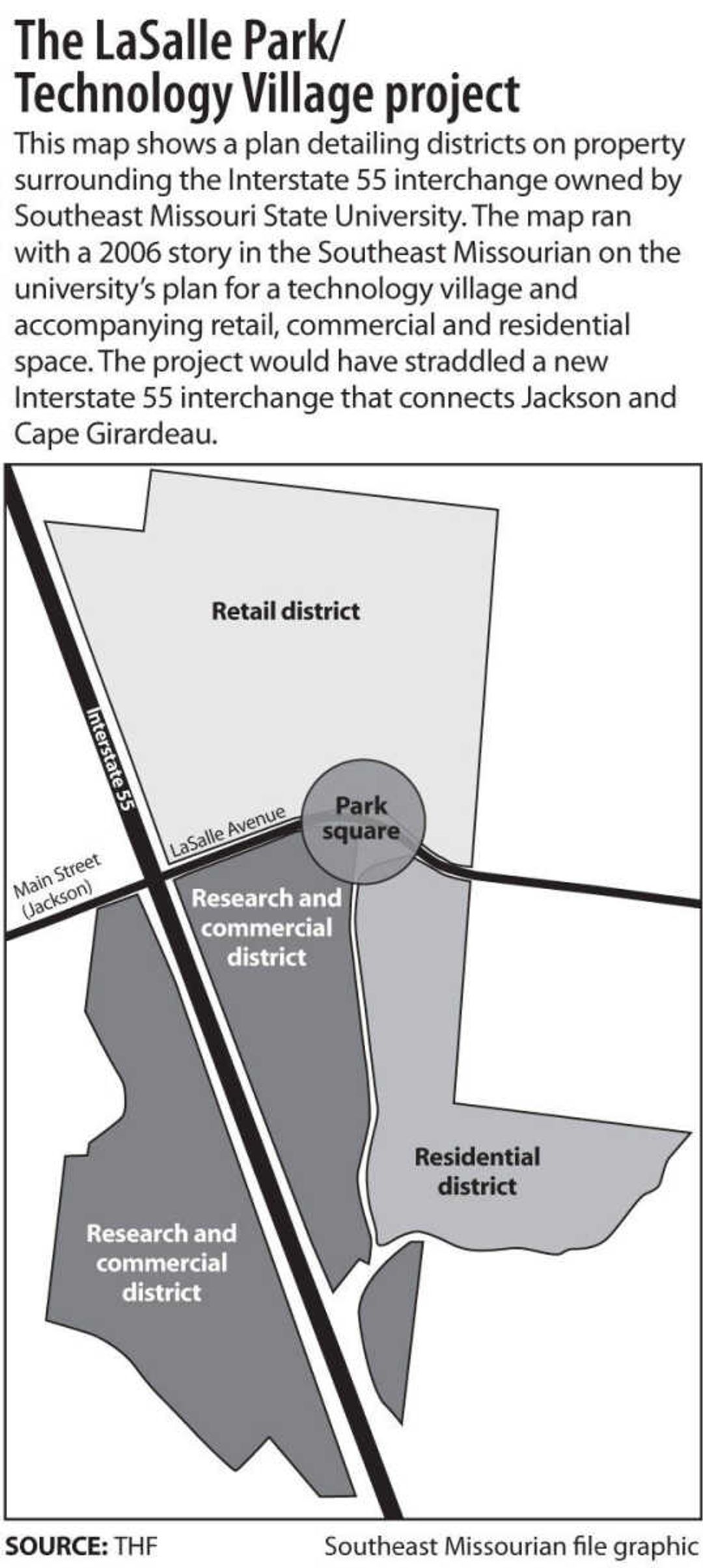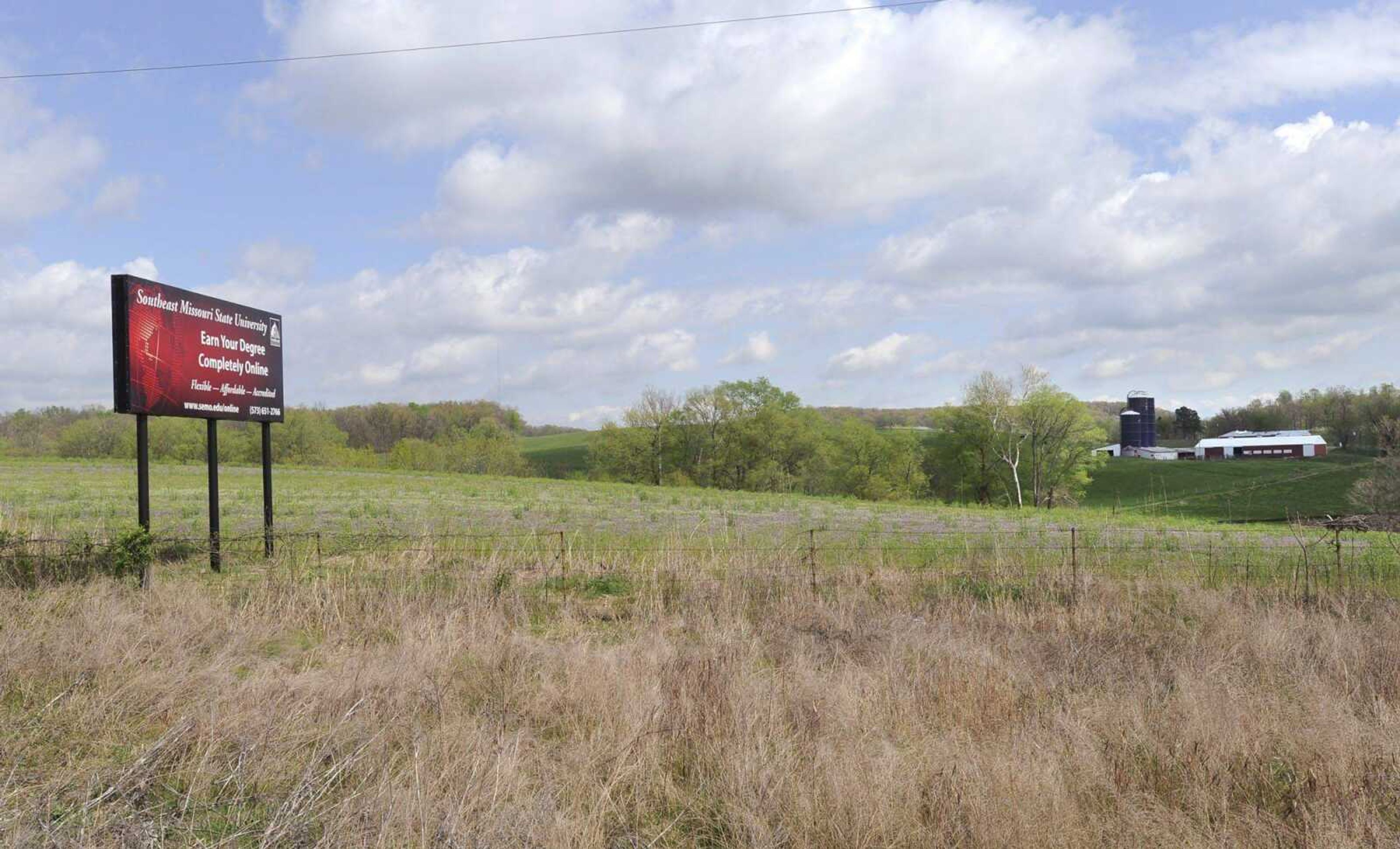Farmland surrounding the newest major traffic interchange between Cape Girardeau and Jackson was planned to be fully developed, or at least on its way there, by 2012. A technology and science research park, new business from big box stores to specialty shops and homes would make about 400 acres owned by Southeast Missouri State University a "major hit," according to the former executive director of the university's Innovation Center and CEO of its research foundation, Dennis Roedemeier.
He retired in 2009, around the same time university officials and leaders of both cities realized the only major hit coming to Southeast Missouri was one on its economy and that it was time to put the project on hold.
A sign on the east side of Interstate 55 near the East Main Street and LaSalle Avenue interchange that advertised the university's Technology Village has been removed. Replacing it is an advertisement for the university's online degree offerings.
Talks of and plans for a technology park began in the early 2000s after the Missouri Department of Transportation finalized plans for the interchange. The university hired Roedemeier in 2002 in anticipation of developing the area. Ten years later, university president Dr. Ken Dobbins sees a different possibility for the development of the park and associated development.
"I don't see it in the near future. I really don't," he said.
Others, like Southeast Missouri State Foundation executive director Bill Holland, agree.
"The grand plan that was once there has kind of been put on the back burner," he said.
The university currently has no plans for the area that once held a demonstration farm. That farm was moved to near Gordonville in 2008 and expanded into a research farm in anticipation of development projects beginning near the interchange. The area that was once a farm is now being leased for farming again.
Representatives of the university, city leaders and business leaders say the state of the economy since 2008 is to blame for no movement to develop the area, which was once projected to be able to provide between $6.5 million and $8.5 million in annual tax revenue for the local economy.
"Once the recession hit, the demand for the types of projects that would have gone in out there kind of fell through the floor," Holland said.
There was interest in locating business in the area. In 2006, biopharmaceutical company Chlorogen Inc. canceled an oral commitment to locate facilities in the technology park, and would have been the technology park's first tenant. The company instead decided on a Kentucky location.
The technology park was designed to attract businesses related to the study of life science.
Dobbins said the park's development would have given university students and faculty opportunities for using technology, applied technology and conducting research.
There was also interest on the retail side from THF, a St. Louis-based commercial developer known for bringing large retailers. The developer also lost interest in the area with the economic downturn, said Cape Girardeau city manager Scott Meyer. Meyer is also the university's former director of facilities management.
Meyer said the technology park and related projects met the same fate as many others around the country when the recession hit.
"I think it's like a lot of things," he said. "When the national economy pulled back, investment money became very difficult to get. A lot of areas that looked ripe for development found there wasn't capital out there to pursue what could happen."
Meyer said that even with plans on hold he believes the construction of arterial roads, like Veterans Memorial Drive, may eventually spur some development near the interchange. That road will eventually extend from LaSalle Avenue to Hopper Road. The second phase of its construction is slated to begin this summer.
Meyer said more access to the university-owned property provided by the road should help to market it to potential developers, but that it also needs the right business.
According to former Cape Girardeau Area Magnet executive director Mitch Robinson, the company that gets the ball rolling in the development will need to have a large plan in mind.
"It's going to take a pretty good-sized project with some really strong anchors to move into any area, not just the LaSalle and East Main interchange," he said.
Competition for developers along the interstate will also affect the future of the area near the interchange, he said. The Drury Company, which owns land along Center Junction, is encouraging projects to go into that area as well, he said.
Plans for the technology park originally called for life sciences businesses incubated at the university's Innovation Center to move into locations there, but a restructure of the Innovation Center and the Missouri Research Corp. in 2009 put more focus on small-business startups and entrepreneurship. Since then, the university has garnered much recognition and numerous grants for its programs through the Innovation Center, and continues to expand its small-business training programs into Southeast Missouri communities.
Robinson and Meyer said they see no problems with the property itself -- it's in a prime location and has good topography.
"I don't really see how things could have been done differently," Robinson said. "It was the timing that threw this off. None of us knew how far down the economy was going to go."
Dobbins and Holland said the university is open to alternative plans for the area if it continues to seem that a technology park will never come to be.
eragan@semissourian.com
388-3627
Pertinent address:

One University Plaza, Cape Girardeau, MO
Connect with the Southeast Missourian Newsroom:
For corrections to this story or other insights for the editor, click here. To submit a letter to the editor, click here. To learn about the Southeast Missourian’s AI Policy, click here.







